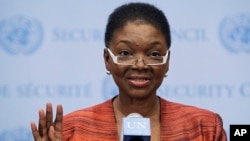GENEVA —
A senior U.N. official says millions of people caught in crises are unable to get the aid they need due to a lack of funding. The U.N. says most of these crises are potentially explosive and could erupt into regional conflicts.
The United Nations has appealed for a record $16.9 billion to assist 54 million people in 28 countries this year. Nearly half the year has passed and only 30 percent of that money, or $5.2 billion has been received.
U.N. humanitarian chief Valerie Amos says people should do the math and they will see the difficulties aid agencies face. While contributions are slow in coming, she says, there is no let up in humanitarian crises, which are expanding in scale and depth.
She cites Syria, the Central African Republic, and South Sudan as the three top-level crises. She says Syria is the biggest of the three, with more than nine million internally displaced people and nearly three million refugees in neighboring countries in need of help.
Amos tells VOA it is still too soon to tell what impact the recent violence in Iraq and the takeover of the city of Mosul will have on humanitarian operations in Syria.
“One of the border crossings that we have been looking at as a possibility of getting aid from Iraq into Syria is one of the border crossings that is now controlled by ISIS as a result of the recent action... But, at the moment, we have a major concern about how we can deal with the huge amount of displacement that we have seen in the last few days just as a result of the fighting in Mosul,” said Amos.
The United Nations estimates one half million people have fled Mosul, about 300,000 to Kurdistan.
Meanwhile, Amos says urgently needed protection and basic relief for some 2.5 million men, women, and children in the Central African Republic is at risk.
She says the situation is becoming more critical by the day in South Sudan, where 1.5 million people have been uprooted by violence in the past six months.
“With the onset of the rains, cholera has broken out and malaria is taking its toll on children and on adults alike. Aid agencies have just released a new plan to help 3.8 million people in South Sudan by December with emergency health care, food, clean water, sanitation, and shelter. There is no time to waste if we are to avoid a famine later in the year,” she said.
Amos says she is pleased a recent fund raiser in Oslo managed to raise $600 million for South Sudan. She says if access improves and funding continues, aid agencies can make a difference.
The United Nations has appealed for a record $16.9 billion to assist 54 million people in 28 countries this year. Nearly half the year has passed and only 30 percent of that money, or $5.2 billion has been received.
U.N. humanitarian chief Valerie Amos says people should do the math and they will see the difficulties aid agencies face. While contributions are slow in coming, she says, there is no let up in humanitarian crises, which are expanding in scale and depth.
She cites Syria, the Central African Republic, and South Sudan as the three top-level crises. She says Syria is the biggest of the three, with more than nine million internally displaced people and nearly three million refugees in neighboring countries in need of help.
Amos tells VOA it is still too soon to tell what impact the recent violence in Iraq and the takeover of the city of Mosul will have on humanitarian operations in Syria.
“One of the border crossings that we have been looking at as a possibility of getting aid from Iraq into Syria is one of the border crossings that is now controlled by ISIS as a result of the recent action... But, at the moment, we have a major concern about how we can deal with the huge amount of displacement that we have seen in the last few days just as a result of the fighting in Mosul,” said Amos.
The United Nations estimates one half million people have fled Mosul, about 300,000 to Kurdistan.
Meanwhile, Amos says urgently needed protection and basic relief for some 2.5 million men, women, and children in the Central African Republic is at risk.
She says the situation is becoming more critical by the day in South Sudan, where 1.5 million people have been uprooted by violence in the past six months.
“With the onset of the rains, cholera has broken out and malaria is taking its toll on children and on adults alike. Aid agencies have just released a new plan to help 3.8 million people in South Sudan by December with emergency health care, food, clean water, sanitation, and shelter. There is no time to waste if we are to avoid a famine later in the year,” she said.
Amos says she is pleased a recent fund raiser in Oslo managed to raise $600 million for South Sudan. She says if access improves and funding continues, aid agencies can make a difference.




